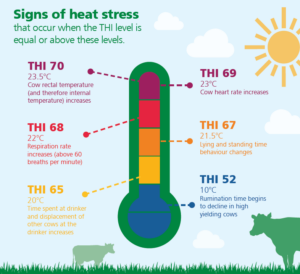Did you know that we as humans experience temperatures very differently from cows? Humans do not really feel the impact of heat until temperatures reach 31°C, yet at the typical UK relative humidity of 60%, cows start to become physically uncomfortable from temperatures as low as 20°C.
With summer just around the corner, the combination of warmer temperatures and our naturally humid climate leaves cows vulnerable to thermal stress. This causes many changes in both cow behaviour and biological responses, which in turn leads to reduced fertility and production. Signs of thermal stress can occur if the temperature-humidity index (THI) crosses any of the thresholds in figure 1, even for just 1-2 hours a day.
Bulling activity is impacted once daily 24-hour average temperatures exceed as little as 14°C (THI 57) and conception rates from 20°C (THI 65). These problems are often recognised on farm, with it being almost an accepted occurrence that fertility is not as good in the summer months as it is from October to April.
What can we do to keep cows comfortable during hot spells?
Being proactive with adapting management and feeding to prepare cows to cope with the heat is key. Waiting until you see milk production drop is too late, as by then fertility will have already been affected, with far reaching consequences for your herd. Ensure sheds have shaded areas so cows can escape the sun’s heat and consider fitting fans, with the collecting yard your first area of focus as this can become extremely hot and humid as cows crowd waiting for milking. Over beds is another crucial area as cows are less likely to lie and chew their cud if they are hot.
Tweaking feeding to make smaller mixes more often or feeding out earlier and later in the day can also help encourage intakes, keeping feed fresher and allowing cows to eat fresh feed during the cooler times of the day. A good quality rumen buffer or rumen health pack should be included in the ration to help maintain digestion, whilst a cooling feed additive can lower body temperature and keep cows hydrated.
With summers getting warmer in the UK, monitoring your cows, and making appropriate management changes can help keep your cows comfortable and performing their best through whatever the weather throws at them.
Contact your local NWF sales specialist for more information or to order a free temperature and humidity index monitor for your shed.
By Adam Clay, Head of Technical

